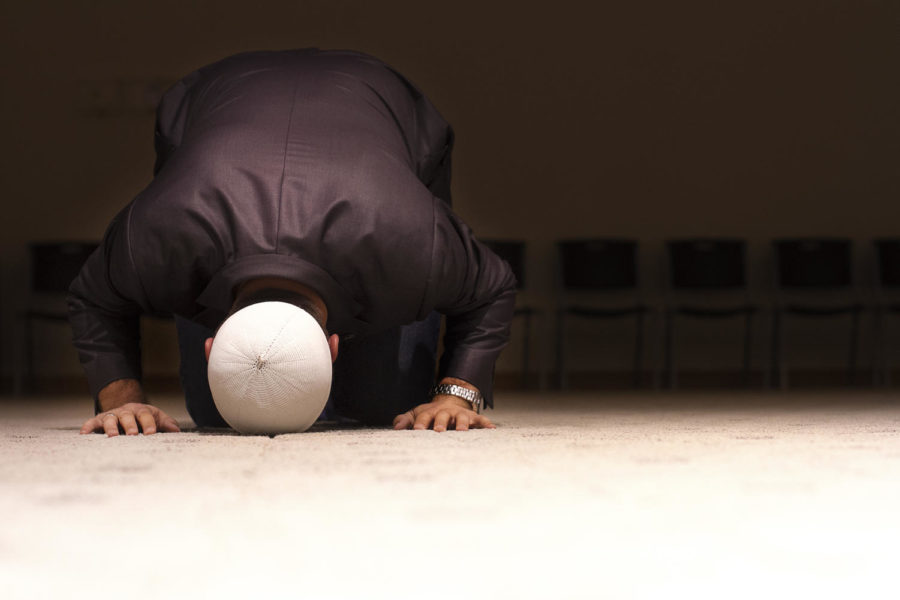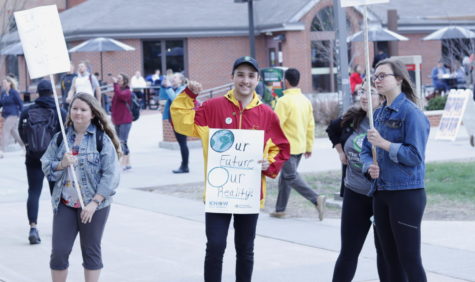Students speak out about Islamophobia
A member of the Darul Arqum Islamic Center in Ames prays during salat, the Islam pillar of prayer. Muslims pray toward Kaaba, a sacred building in Mecca. Islam is a peaceful religion, contradicting the prejudices formed after the 9/11 terrorist attacks.
September 18, 2013
Islamophobia — the hatred or fear of Islam or Muslims or of their politics or culture, stemming from the 9/11 attacks.
“After 9/11, people figured out how much we need to really talk about commonalities other than differences,” said Ahmet Dursun, graduate assistant in English and treasurer of the Society of Peace and Dialog. “It also pointed out a big need for humanity … the need for coming together and being together from whatever background you are … and then being able to respect each other and love each other.”
The attack on 9/11 also created a negative reaction against Muslims not only in the United States but around the world, Dursun said. This is known as Islamophobia.
“I think this whole word, jihad, is taken way out of context and the fact that those people that committed those horrible acts on 9/11 are using Islam to justify their means, I think, is one of the biggest causes for this Islamophobia that’s going around,” said Elvir Klempic, junior in political science. “Even though a few thousand of those people cannot represent the whole religion.”
The Society of Peace and Dialog will bring in a speaker Wednesday to talk about the challenges of being a Muslim living in America and misconceptions of the religion as part of 11 Days of Global Unity, which has been celebrated since 2004.
Dursun and Akmal Mirsadikov, vice president of the society and graduate assistant in business administration, both hope the lecture speaks not only to non-Muslims, but Muslims on how to be more open-minded and appreciate other religions.
“I’m an optimist when it comes to Islamophobia,” Klempic said. “I do believe it is going to end, and people will understand not to judge all of Muslims … by [the] actions of some.”
Ebulimiti Aikebai, graduate assistant in architecture, along with Dursun, Mirsadikov and Klempic, said no part of their religion justifies the terrorist attacks on 9/11.
“I think terrorism cannot be explained in any religion or any culture … it cannot be justified anywhere,” Mirsadikov said.
Klempic moved to America from Bosnia about four months before 9/11. Personally, he said he has never felt any hatred toward him because of his religion and this may be because his skin color is white.
“I think the color of the skin plays a huge role in all of the Islamophobia,” Klempic said. “Now if I looked Middle Eastern, I think my experiences might have been a little different.”
Klempic said he has seen drivers shout mean things to Muslims in prayer and people give covered women strange looks.
Aikebai moved to the United States last year from China and said he has not experienced hate toward him, but once people find out he is Muslim, they might shy away.
“You feel a little bit uncomfortable,” Aikebai said.
Aikebai, who is involved in the community and does volunteer work, said that usually when people get to know him, uncomfortable feelings go away.
Dursun moved to the United States from Turkey in 2007 and has had only one negative experience when students on his dorm floor cursed the Muslim prophet on a bathroom door. Dursun later became friends with those on his floor after a discussion with them.
“Engaging in dialogues with people of different backgrounds and being able to express yourself freely and know others helps building the sense of appreciation,” Dursun said. “So that’s why I didn’t have any misinterpretation or misconception from Americans on my side.”
After moving to the United States from Uzbekistan in 2010, Mirsadikov has not felt negative effects of Islamophobia, he said.
“America, in my mind, is almost like a heaven for any people practicing almost any religion, because it’s a safe environment here,” Mirsadikov said.
Mirsadikov and Dursun said they hope that from the lecture, people can move one step closer to appreciating each other, but this will never happen at the country or community level unless it happens at the personal level.

















